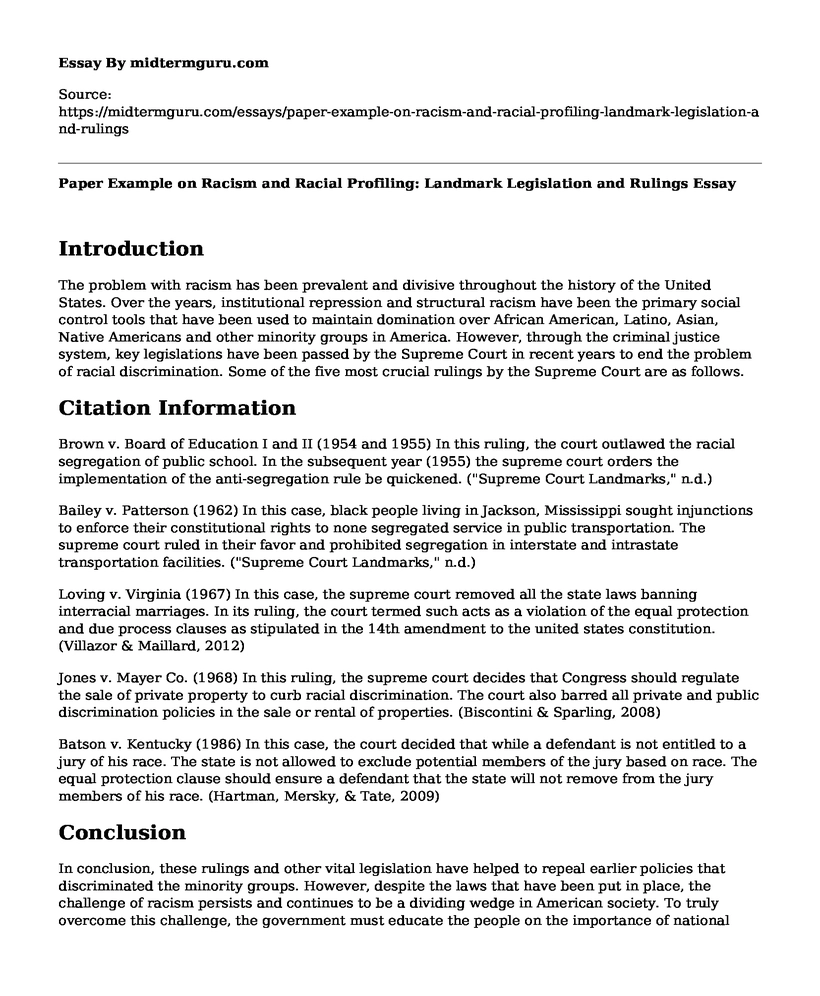Introduction
The problem with racism has been prevalent and divisive throughout the history of the United States. Over the years, institutional repression and structural racism have been the primary social control tools that have been used to maintain domination over African American, Latino, Asian, Native Americans and other minority groups in America. However, through the criminal justice system, key legislations have been passed by the Supreme Court in recent years to end the problem of racial discrimination. Some of the five most crucial rulings by the Supreme Court are as follows.
Citation Information
Brown v. Board of Education I and II (1954 and 1955) In this ruling, the court outlawed the racial segregation of public school. In the subsequent year (1955) the supreme court orders the implementation of the anti-segregation rule be quickened. ("Supreme Court Landmarks," n.d.)
Bailey v. Patterson (1962) In this case, black people living in Jackson, Mississippi sought injunctions to enforce their constitutional rights to none segregated service in public transportation. The supreme court ruled in their favor and prohibited segregation in interstate and intrastate transportation facilities. ("Supreme Court Landmarks," n.d.)
Loving v. Virginia (1967) In this case, the supreme court removed all the state laws banning interracial marriages. In its ruling, the court termed such acts as a violation of the equal protection and due process clauses as stipulated in the 14th amendment to the united states constitution. (Villazor & Maillard, 2012)
Jones v. Mayer Co. (1968) In this ruling, the supreme court decides that Congress should regulate the sale of private property to curb racial discrimination. The court also barred all private and public discrimination policies in the sale or rental of properties. (Biscontini & Sparling, 2008)
Batson v. Kentucky (1986) In this case, the court decided that while a defendant is not entitled to a jury of his race. The state is not allowed to exclude potential members of the jury based on race. The equal protection clause should ensure a defendant that the state will not remove from the jury members of his race. (Hartman, Mersky, & Tate, 2009)
Conclusion
In conclusion, these rulings and other vital legislation have helped to repeal earlier policies that discriminated the minority groups. However, despite the laws that have been put in place, the challenge of racism persists and continues to be a dividing wedge in American society. To truly overcome this challenge, the government must educate the people on the importance of national unity and why it is essential to abolish petty differences such as race. Besides, the war on racism will not be won by passing strict laws alone, but it will also entail changing the mindset and the attitude of people involved.
References
Biscontini, T. V., & Sparling, R. (2008). Amendment XIII: Abolishing Slavery. New York, NY: Greenhaven Publishing LLC.
Hartman, G. R., Mersky, R. M., & Tate, C. L. (2009). Landmark Supreme Court Cases: The Most Influential Decisions of the Supreme Court of the United States. New York, NY: Infobase Publishing.
Supreme Court Landmarks. (n.d.). Retrieved from https://www.uscourts.gov/about-federal-courts/educational-resources/supreme-court-landmarks. Accessed 08 March 2019
Villazor, R. C., & Maillard, K. N. (2012). Loving V. Virginia in a Post-Racial World: Rethinking Race, Sex, and Marriage. Cambridge, England: Cambridge University Press.
Cite this page
Paper Example on Racism and Racial Profiling: Landmark Legislation and Rulings. (2022, Sep 11). Retrieved from https://midtermguru.com/essays/paper-example-on-racism-and-racial-profiling-landmark-legislation-and-rulings
If you are the original author of this essay and no longer wish to have it published on the midtermguru.com website, please click below to request its removal:
- How Women Testifying in Courts Should Be Treated - Paper Example
- Juvenile Crime Rate Paper Example
- Paper Example on Class Distinction and Human Rights
- Lackawanna Six: 6 Friends Prosecuted for Supporting Al-Qaeda - Research Paper
- Women, Abortion, and Social Inequity - Essay Sample
- Article Analysis Essay on Demarginalizing the Intersection of Race and Sex
- Animal Testing Should Be Banned - Argumentative Essay







